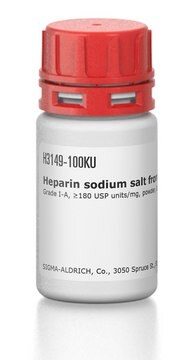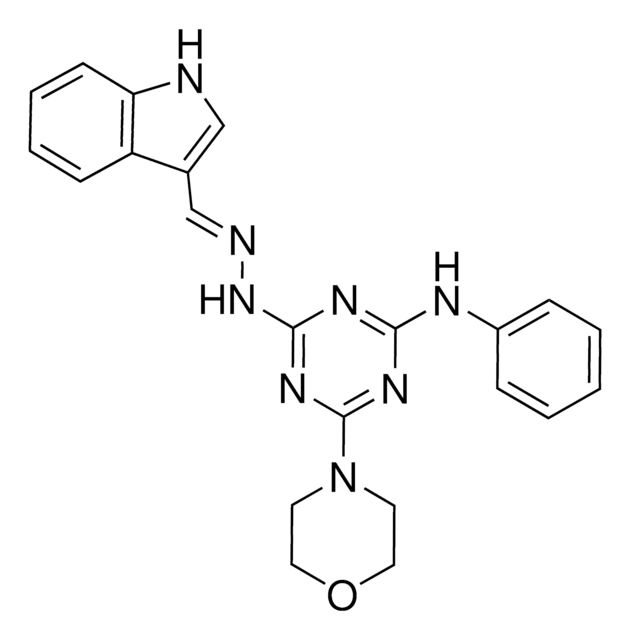15-105
mTOR phosphorylation Pathway Explorer Antibody MiniPack
This Antibody pack of Anti-mTOR antibodies contains Anti-phospho-mTOR Antibody(Ser2481), Anti-phospho-mTOR Antibody (Thr2446), Anti-phospho-mTOR (Ser2448).
동의어(들):
FKBP12-rapamycin complex-associated protein 1, FKBP-rapamycin associated protein, Mammalian target of rapamycin, Rapamycin target protein, rapamycin associated protein FRAP2
로그인조직 및 계약 가격 보기
모든 사진(6)
About This Item
UNSPSC 코드:
12161503
eCl@ss:
32161000
NACRES:
NA.77
추천 제품
생물학적 소스
rabbit
Quality Level
항체 형태
affinity isolated antibody
정제법
affinity chromatography
제조업체/상표
Upstate®
기술
activity assay: suitable
NCBI 수납 번호
UniProt 수납 번호
배송 상태
dry ice
유전자 정보
human ... MTOR(2475)
일반 설명
Pathway Explorer Antibody MiniPack:
Each Pathway Explorer Antibody Minipack contains three related antibodies as part of a signaling cascade or a combination of total and phosphorylated forms of key signaling targets. Each of the three antibodies are 30% the original pack size. Full size versions of each of the Pathway Explorer antibodies are available for sale individually under the same catalog number with the removal of “SP” off of each one (e.g. 05-591SP can be ordered as 05-591).
mTOR:
mTOR (Mammalian Target of Rapamycin, aka FRAP, RAPT or RAFT) is a large 289 kDa Ser/Thr protein kinase that regulates cell cycle progression, cell growth, protein synthesis, ribosome biogenesis, and autophagy. mTOR is an evolutionarily conserved member of the Phosphoinositol Kinase-related Kinase (PIKK) family whose activity is regulated by phosphorylation on Ser2448 by Akt in response to insulin or muscle activity. Interestingly, mTOR is the central component of two multimeric kinase complexes consisting of mTOR and numerous other mTOR binding proteins. These two multimeric protein complexes are designated mTORC1 and mTORC2. mTORC1 (mTOR Complex 1) consists of at least mTOR, Raptor, and GβL (mLST8). mTORC1 is known to play a central role in insulin signaling, which is crucial in maintaining metabolic homeostasis. The complex is activated primarily though the PI3 Kinase/Akt pathway. Upon insulin stimulation, Akt activates mTORC1 by phosphorylating and inhibiting TSC (and possibly other yet discovered targets and/or mTOR itself). This inhibits the upstream small GTPase regulator Rheb (Ras homolog enriched in brain). This inhibits the kinase activity of the mTORC1 complex, thus disabling its ability to phosphorylate its downstream targets such as p70 S6K on Thr389 and 4E-BP1 on Thr229. The other mTOR complex, mTORC2 (mTOR Complex 2), is made up of at least mTOR, Rictor, GL, Sin1, Protor 1 and 2. mTORC2 affects cell proliferation and survival primarily by phosphorylating the hydrophobic motif of Akt on Ser473, a well-known effecter of the PI3 Kinase pathway. In addition to phosphorylating Akt, the mTORC2 complex is also known to effect cytoskeletal organization and migration by exerting its effects through Rac, Rho, and PKC. Interestingly, unlike mTORC1, the mTORC2 complex appears to not be inhibited by treatment with rapamycin and for this reason is referred to as the rapamycin-insensitive complex. Defects in both mTOR complexes are associated with a variety of diseases, including cancer and diabetes.
*See full size versions for corresponding references.
Each Pathway Explorer Antibody Minipack contains three related antibodies as part of a signaling cascade or a combination of total and phosphorylated forms of key signaling targets. Each of the three antibodies are 30% the original pack size. Full size versions of each of the Pathway Explorer antibodies are available for sale individually under the same catalog number with the removal of “SP” off of each one (e.g. 05-591SP can be ordered as 05-591).
mTOR:
mTOR (Mammalian Target of Rapamycin, aka FRAP, RAPT or RAFT) is a large 289 kDa Ser/Thr protein kinase that regulates cell cycle progression, cell growth, protein synthesis, ribosome biogenesis, and autophagy. mTOR is an evolutionarily conserved member of the Phosphoinositol Kinase-related Kinase (PIKK) family whose activity is regulated by phosphorylation on Ser2448 by Akt in response to insulin or muscle activity. Interestingly, mTOR is the central component of two multimeric kinase complexes consisting of mTOR and numerous other mTOR binding proteins. These two multimeric protein complexes are designated mTORC1 and mTORC2. mTORC1 (mTOR Complex 1) consists of at least mTOR, Raptor, and GβL (mLST8). mTORC1 is known to play a central role in insulin signaling, which is crucial in maintaining metabolic homeostasis. The complex is activated primarily though the PI3 Kinase/Akt pathway. Upon insulin stimulation, Akt activates mTORC1 by phosphorylating and inhibiting TSC (and possibly other yet discovered targets and/or mTOR itself). This inhibits the upstream small GTPase regulator Rheb (Ras homolog enriched in brain). This inhibits the kinase activity of the mTORC1 complex, thus disabling its ability to phosphorylate its downstream targets such as p70 S6K on Thr389 and 4E-BP1 on Thr229. The other mTOR complex, mTORC2 (mTOR Complex 2), is made up of at least mTOR, Rictor, GL, Sin1, Protor 1 and 2. mTORC2 affects cell proliferation and survival primarily by phosphorylating the hydrophobic motif of Akt on Ser473, a well-known effecter of the PI3 Kinase pathway. In addition to phosphorylating Akt, the mTORC2 complex is also known to effect cytoskeletal organization and migration by exerting its effects through Rac, Rho, and PKC. Interestingly, unlike mTORC1, the mTORC2 complex appears to not be inhibited by treatment with rapamycin and for this reason is referred to as the rapamycin-insensitive complex. Defects in both mTOR complexes are associated with a variety of diseases, including cancer and diabetes.
*See full size versions for corresponding references.
면역원
Epitope: 09-345SP:phosphorylated Thr2446 of mTOR
09-213SP: phosphorylated Ser2448 of mTOR
09-343SP: phosphorylated Ser2481 of mTOR
09-213SP: phosphorylated Ser2448 of mTOR
09-343SP: phosphorylated Ser2481 of mTOR
애플리케이션
Pathway Explorer Antibody MiniPack
Research Category
Signaling
Apoptosis & Cancer
Signaling
Apoptosis & Cancer
Research Sub Category
PI3K, Akt, & mTOR Signaling
Glucose/Glycogen Metabolism
Insulin/Energy Signaling
PI3K, Akt, & mTOR Signaling
Glucose/Glycogen Metabolism
Insulin/Energy Signaling
This Antibody pack of Anti-mTOR antibodies contains Anti-phospho-mTOR Antibody(Ser2481), Anti-phospho-mTOR Antibody (Thr2446), Anti-phospho-mTOR (Ser2448).
포장
Each vial is 30% the size of the parent catalog number
성분
09-343SP Anti-phospho-mTOR (Ser2481); 30 µL
09-345SP Anti-phospho-mTOR (Thr2446); 30 µL
09-213SP Anti-phospho-mTOR (Ser2448); 60 µL
09-345SP Anti-phospho-mTOR (Thr2446); 30 µL
09-213SP Anti-phospho-mTOR (Ser2448); 60 µL
물리적 형태
3 individual tubes each containing antibodies directed against one of the three phosphorylated forms of mTOR (Thr2446, Ser2448, and Ser2481)
법적 정보
UPSTATE is a registered trademark of Merck KGaA, Darmstadt, Germany
면책조항
Unless otherwise stated in our catalog or other company documentation accompanying the product(s), our products are intended for research use only and are not to be used for any other purpose, which includes but is not limited to, unauthorized commercial uses, in vitro diagnostic uses, ex vivo or in vivo therapeutic uses or any type of consumption or application to humans or animals.
Storage Class Code
10 - Combustible liquids
시험 성적서(COA)
제품의 로트/배치 번호를 입력하여 시험 성적서(COA)을 검색하십시오. 로트 및 배치 번호는 제품 라벨에 있는 ‘로트’ 또는 ‘배치’라는 용어 뒤에서 찾을 수 있습니다.
Arkadiusz D Liśkiewicz et al.
Frontiers in endocrinology, 12, 568197-568197 (2021-03-16)
Obesity cardiomyopathy increases the risk of heart failure and death. Obesity is curable, leading to the restoration of the heart phenotype, but it is not clear if there are any after-effects of obesity present after weight loss. We characterize the
자사의 과학자팀은 생명 과학, 재료 과학, 화학 합성, 크로마토그래피, 분석 및 기타 많은 영역을 포함한 모든 과학 분야에 경험이 있습니다..
고객지원팀으로 연락바랍니다.








